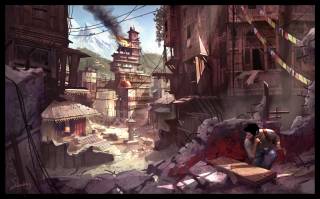Robbed of Potential: The Role of the Thief
By ahoodedfigure 20 Comments
Watching E.R. today, I saw them go behind the counter and steal a coffee from the microwave. In the real world that's practically theft (yes, even if you're an FBI agent), but in games it's expected for us to peek around corners and kype stuff.
I remember going into every house in, say, Phantasy Star III, trying to find hidden chests and stuff under the bed. We know that these places are laid out for us to explore, yet there's a tension, akin to the tension I talked about earlier between narrative and gameplay, between what we know generally as the system of law that most societies have that frowns upon taking stuff from other people, and the desire for us to fully explore the world that the designers have given us.

I think a fantasy or science fiction setting might be preferred, because I imagine some media outsiders would treat it as a criminal's training guide otherwise (although I can think of a subversive criticism of juvenile delinquency with game mechanics like this). What I'm talking about, though, is expanding the role of what it means to sneak around and steal. You define what kind of thief you are, and get a range of options to do this in, rather than telling you this is what a thief does.
Specifically, RPGs

Even with a team of all thieves, there would be plenty of wiggle room, especially if there was a flexible system that didn't prevent you from having all the fun equipment one might expect in a computer role-playing game. You could have one who was good at infiltrating places, one that was good at running through town and finding a place to fence things, one that was an assassin-like backstabber, one who was the face of the group and who could con his or her way through high society. Plenty of potential here for a focused game.
That's part of the issue, sometimes, with games that try to let the player do everything: they wind up letting the player do much that the game itself is hamstrung trying to make sure all the options are basically covered. With a focus on a style, theft in this case, you manage to sidestep the general issue of trying to make all classes or roles equal. You make a game where stealing and dungeon delving is the focus, you make these almost like minigames or strategical battles even when there's no overt bloodshed, so that every role is potentially appealing. Full of potential, without needing to fulfill EVERY hero role we've accumulated in pop culture over however many years.
--
Any thief-styled games come to mind that break genre molds? Thief: The Dark Project, et al, are obvious examples of thief-focused games, but can you think of others? How about different ways that thieves were treated in games that didn't necessarily focus on thieves?
